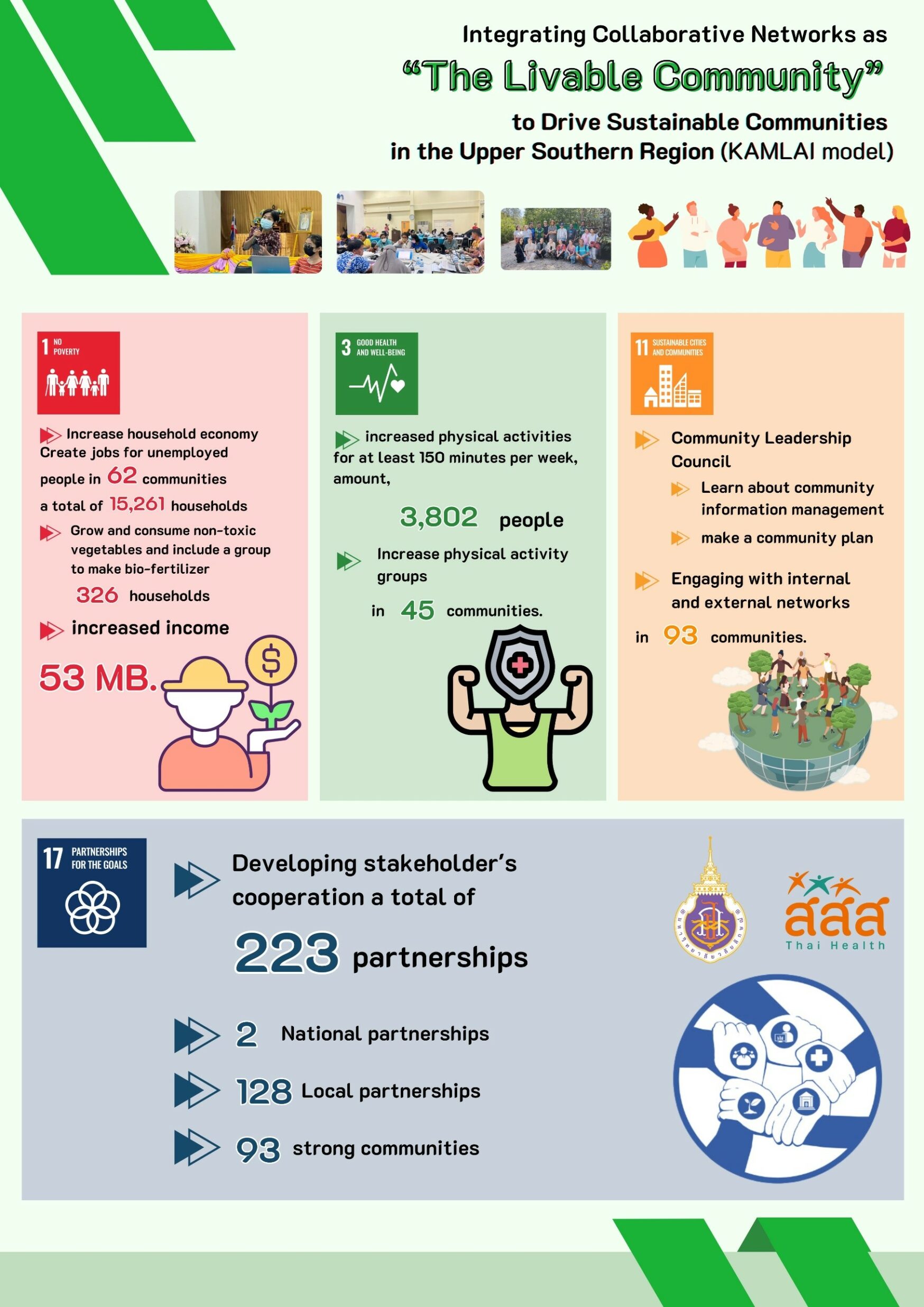Integrating Collaborative Networks to drive towards “The Livable Community”, Sustainable Communities in the Upper Southern Region (KAMLAI model)
The “Livable Community in the Upper South Region of Thailand” is an initiative organized by the School of Nursing at Walailak University. It brings together community leaders and academic supporters from the seven upper south regions with the generous backing of the Thai Health Promotion Foundation. This project is further segmented into the “Developing the Community Leadership Council Potential to Continuously and Sustainably Promote Livable Communities ” workshop.
Moreover, this project collaborates with local, national, and global health institutions to improve health and well-being outcomes.
The concept of the Livable Community revolves around villages or communities dedicated to advancing health promotion and addressing social determinants of health through the following three key mechanisms:
- Community Leadership Council
- Mentor Mechanism or Academic Support Team
- Area Management Unit Mechanism
These three mechanisms are directed by an individual entrusted with project leadership, who may hold the position of a village headman or community president. Consequently, this project embraces the livable community concept, fostering the development of robust, self-sustaining communities with financial support from the Opportunity Promotion Office (Open Grant) under the aegis of the Thai Health Promotion Foundation. The project has been active from November 2016 through December 2022 and has maintained ongoing participation, involving:
- 15,261 households
- 2,783 Community Leadership Council members
In 2022, all seven upper southern provinces’ communities were engaged in continuous activities that encompassed health promotion, livelihood support, as well as meetings and result tracking activities for community health management in collaboration with various health and local organizations in the area, such as Thasala Subdistrict Municipality.
Being in an international touristic spot, the Bankoakyoong community in Ko Lanta District, Krabi Province, has been coordinated by a network specializing in healthcare and the environment from Germany to participate in a study on community health and promote Bankoakyoong as an international community wellness destination for the future.
WU’s International collaboration with health institutions
Numerous network parties are participating in the operation, numbering between 5-13 parties per area, namely:
- Hospital Parties
- Community Parties
- The Subdistrict Health Promotion Hospital
- The Subdistrict Administrative Organization (SAO)
- The Community Development Department
- The Subdistrict Agricultural Extension Office
- The Fisheries District Office
- School Parties
- Occupational class
- Non-Formal Education
- University Parties
- The Financial Institution
- The Department of Marine and Coastal Resources Office 5
- The Siam Cement Public Company Limited (SCG)
In this regard, the result of a model of the Livable Community in the Upper South Region of Thailand (KAMLAI model) resulted in improved life quality in numerous essential issues:
- Created a strong community leader
- Increased household income
- Increased physical activity
- Influenced people in dietary management, i.e., to eat adequately and appropriately
- Promoted self- health care in the elderly
- Promoted leader of youth volunteering for community development
- Reduced the use of chemicals in agriculture
- Reduced accident rates
- Encouraged people to reduce or quit alcohol and tobacco consumption
Inventor:
Asst. Prof. Kamlai Somrak
School of Nursing Walailak University, Thasala, Nakhon Si Thammarat 80160
Research Fundings & Partner agencies
-Thailand Health Promotion Fund
-Ministry of Public Health
-National Health Commission Office
-National Health Security Office
-Community Organizations Development Institute
Awards:
-Award for outstanding personnel by the main mission of Walailak University.
-Presenting outstanding research at the 11th Walailak Research National Conference.

Related Link:

